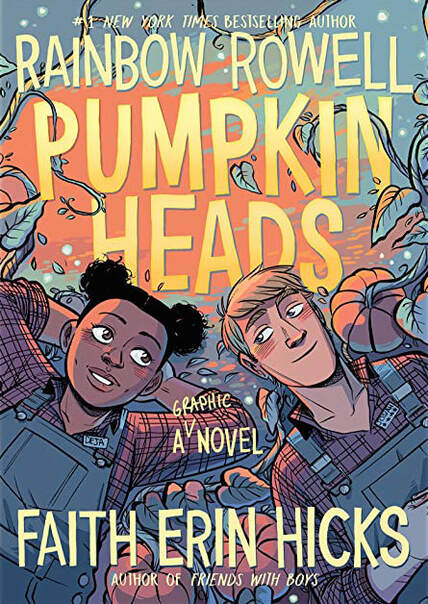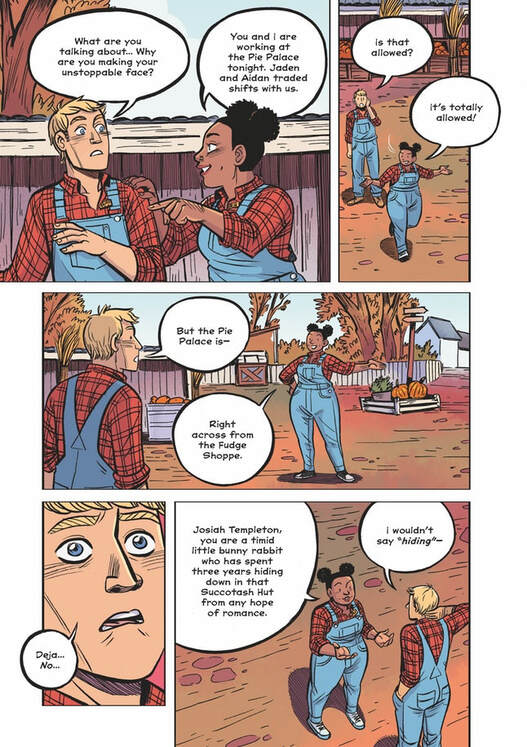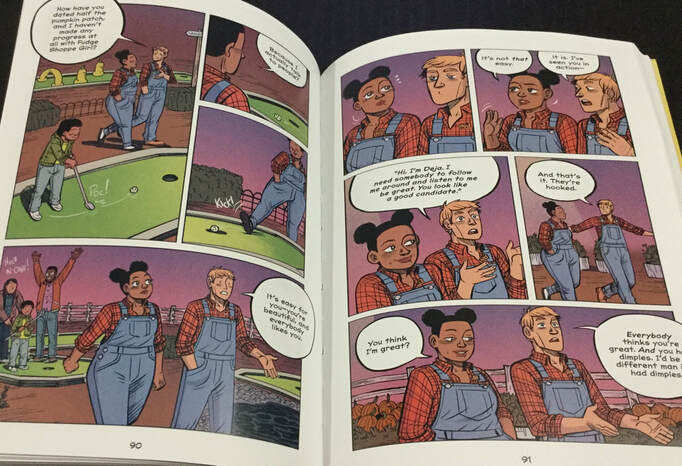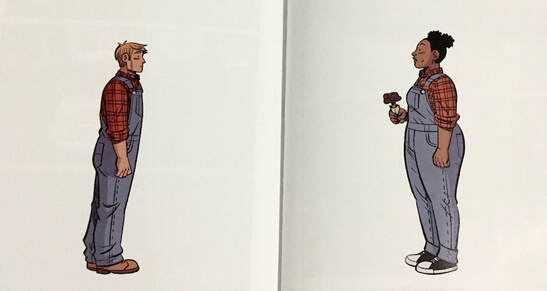|
Pumpkinheads. By Rainbow Rowell and Faith Erin Hicks. Color by Sarah Stern. First Second. ISBN 978-1626721623 (softcover), $17.99; ISBN 978-1250312853 (hardcover), $24.99. 224 pages. Pumpkinheads is a breeze of a graphic novel: a busy, boisterous story of roughly six hours shared by two high school seniors one Halloween night. It follows Deja and Josie (Josiah), two seasonal workers at a Midwestern pumpkin patch (replete with corn maze, hayrides, petting zoo, etc.). Deja and Josie are wistfully anticipating graduation and goodbyes, but insist on sharing this “last” Halloween together, which turns out to be a bit of a crazy night. What starts with a gesture of farewell ends by hinting at the possibility of shared times to come. Deja, who seems to have dated every other girl and boy at the patch, comes across as the more socially conscious and proactive of the two, while Josie, a “most valuable” employee and pumpkin geek, is shy, passive, and obtuse. Deja aims to help Josie talk to another patch worker, a girl he’s been mooning over fecklessly for the past three years—this may be his last chance to break out of his shell and strike up a relationship with her. Yet finding that girl in the big sprawl of the patch proves a challenge, as the two run into one colorful mishap after another. Outwardly, the suspense has to do with getting Josie to that girl, but what really matters is the relationship right in front of us: Josie and Deja. The book hints and hints at the special nature of their friendship—will they recognize it before the night is through? Deja and Josie are complementary opposites, but both love, in an unselfconsciously nerdy way, the corniness of the pumpkin patch and its attractions. Where they differ is in their attitudes toward sociability. Josie is the type to wait for good things to come to him — he doesn’t know how to initiate a relationship — but Deja tells him that he must make choices and act on them if he is to get anywhere with anyone. The plot consists mainly of their walking, talking, and solving minor crises at the patch: together they run into various of Deja’s “exes,” navigate the fudge shoppe, s’mores pit, and corn maze, and reunite a lost child with her mom. There’s a lot of funny, rowdy action, but, again, what matters is their dialogue, which telegraphs an unacknowledged depth of feeling between the two. We readers perhaps get to know them better than they know themselves. Scriptwriter Rainbow Rowell captures the offhand, familiar quality of friendly banter; you can believe that Deja and Josie have known each other for a long time. Cartoonist Faith Erin Hicks supplies (as the book’s back matter makes clear) the layout and rhythms, pacing and punctuating the action with wordless panels full of significant glances and sly, well-observed business. Theirs is a felicitous collaboration, intently focused on the two leads, their comical backdrop, and their dawning self-awareness. The results are seamless and fun to read. Pumpkinheads is perhaps thematically slight, reflecting Rowell’s stated desire to do something “light and joyful.” It may be utopian; certainly it's idyllic and matter-of-factly progressive. Tonally, the book echoes many middle-grade stories that anticipate high school without the critical awareness of social power and inequity typical of YA fiction. Set in an idealized Midwest, it skirts questions of racism and homophobia (Deja, a queer young woman of color, is treated as wholly accepted and socially unremarkable). Implicitly, the book promotes body positivity: Deja is (as Rowell describes her) chubby, and one scene deals subtly with fat-shaming, but her beauty and vivacity are never in doubt. Josie, in contrast, is the very image of cornfed white Midwestern handsomeness. The supporting cast is discreetly diverse (though we learn little about them). Mainly, this is a charming story about discovering the depth of a relationship, equal parts ebullient comedy and quiet romance. Rowell and Hicks understand and love their characters, and Hicks draws their interplay with a keen eye for pauses, insinuations, and unspoken currents of feeling. In the end, Pumpkinheads is succinct, pleasant, and remarkably well crafted: a model middle-grade graphic novel, thematically unexceptional maybe, but sweetly human.
0 Comments
Your comment will be posted after it is approved.
Leave a Reply. |
Archives
June 2024
|





 RSS Feed
RSS Feed
